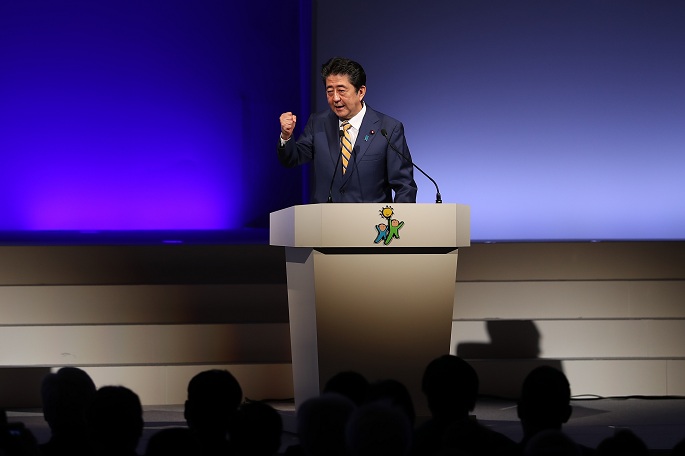Abe maintains constitutional amendment goal amid opposition
Published : 03 May 2019, 19:27
Updated : 04 May 2019, 01:32
Japanese Prime Minister Shinzo Abe on Friday said he still plans to forge ahead with his controversial career goal of amending the nation's pacifist constitution for the first time since World War II.
In a video message that was played at a rally in support of amending the constitution, the Japanese premiere was quoted as saying that he intends to push ahead with his plan proposed in 2017 at the same rally, with the amendment coming into effect by 2020.
"My thoughts haven't changed," Abe said in reference to amending the war-renouncing Article 9 of Japan's Supreme Charter.
"I will create an environment in which all Self Defense-Force (SDF) members can carry out their missions with great pride," Abe said in the video message played at the rally held in Tokyo.
Abe's remarks came as the nation on Friday observed the 72nd anniversary of the supreme charter coming into effect. "Constitution Day" is a national holiday in Japan.
For the supreme law to be revised, Abe will need to secure a two-thirds majority in both houses of parliament and a simple majority in a national referendum.
But, Abe's ruling Liberal Democratic Party's (LDP) coalition ally, Komeito, has voiced concern about the move to change the charter, while some opposition parties have maintained complete reluctance.
Abe's career goal, before and through his two tenures as prime minister, has been to revise the war-renouncing Article 9 of the supreme law, which bans the maintenance of war potential and the use of war as a means of settling international disputes.
The conservative leader believes amending Article 9 by specifically referencing the Self-Defense Forces will clarify the constitutionality of the SDF.
Those opposed to the move, however, believe that such a revision will be used to bolster Japanese forces and their international footprint, in contrast to the pacifist stance of the constitution.
Critics of the prime minister's legacy-led move to amend the constitution believe that Abe, to a greater-or-lesser extent, wishes to remilitarize Japan and see its forces increase their global footprint and operate in scenarios in the future that may not be solely defensive in nature.
The current constitution resolutely forbids this with Article 9 of the pacifist charter, which is held sacred by the majority of citizens in Japan who have protested vehemently against Abe and the LDP at every juncture as they have tried to push ahead with amending the charter.
Polls here have shown that the majority of citizens here are opposed to any revision to the charter, with notable political analysts highlighting that a referendum on the matter could be disastrous.
"Even if Abe manages to force a revision through parliament, he would face a referendum, raising the prospect of a 'Brexit-style' political meltdown if the people vote against him," Yu Uchiyama, a political scientist at the University of Tokyo, said of the matter.

